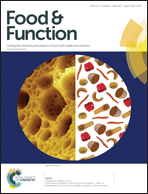Are lutein, lycopene, and β-carotene lost through the digestive process?
Abstract
The bioavailability of many carotenoids has been assessed, but little attention has been given to the metabolism of these antioxidant compounds during digestion. The isomerization and loss of lutein, lycopene, and β-carotene incorporated into a lipid-rich liquid meal was determined in vitro through the gastric, duodenal, and jejunal phases in the presence and absence of digestive enzymes, and in the presence and absence of known oxidizing agents often found in mixed meals (metmyoglobin in red meat and ferrous sulfate in supplemental iron). Carotenoids were quantitated using HPLC-PDA. In the absence of enzymes, lutein and lycopene were lost during earlier phases of the digestive process. In the presence of enzymes, lutein and lycopene were robust through the gastric and duodenal phases, with statistically significant losses of 40% and 20%, respectively, observed only during the jejunal phase. Regardless of the presence or absence of enzymes, an initial 25% of β-carotene was lost during the gastric phase, but no further loss was observed. Ferrous sulfate had no significant impact on any carotenoid level. Metmyoglobin had no impact on lutein, but significantly reduced lycopene and β-carotene levels by 30% and 80%, respectively, by the end of the jejunal phase. No significant isomerization was observed between the initial and jejunal phases for any of the carotenoids.



 Please wait while we load your content...
Please wait while we load your content...